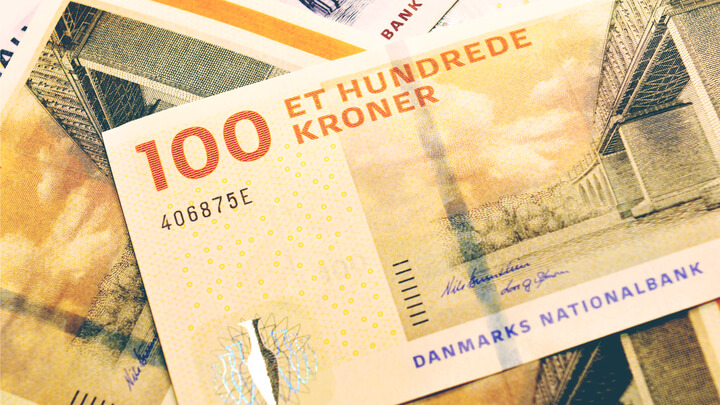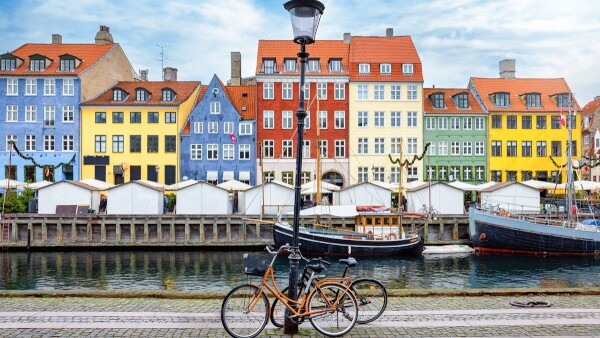Is it better to use cash or card in Denmark?
Should you pay with cash or card in Denmark? A handy guide including cash etiquette, Danish ATMs and using your UK card.

The local currency in Denmark is the Danish Kroner (DKK). It’s been the country’s official currency since 1875. While the Krone is officially the currency of Denmark, it’s also used in the Faroe Islands and Greenland.
This article will tell you all you need to know about the Danish currency, and how to exchange your money for your travels. As well as introducing a smart way to spend while you’re abroad - with the Wise multi-currency account with debit Mastercard.
| Get your Wise debit Mastercard - and spend anywhere in the world. |
|---|
While the Kroner is Denmark’s official currency and is accepted everywhere, you may still be able to pay in Euros.
It depends where you go, as some vendors in bigger cities will accept Euros. But crucially – they aren’t legally obliged to, even though Denmark is an EU member state. It’s always a good idea to have Kroner or an alternative means of payment with you, just in case.
It’s also possible that you will be given change in Kroner if you use Euros, leaving you with an unfavourable exchange rate on all that spare change.
| Kroner Symbols | kr. |
|---|---|
| 1 DKK | 1 DKK is divided into 100 Øre. |
| DKK Coins | Coins are available in 1-kr, 2-kr, 5-kr, 10-kr, and 20-kr. |
| DKK Banknotes | Bills start at 50 kroner and go up to 1000 DKK, with 100 DKK, 200 DKK and 500 DKK banknotes in between. |
| Spend anywhere in the world with low conversion fees, and zero transaction fees. |
|---|
| Get your Wise debit Mastercard - and see how much you can save! |
Never lose out on the exchange rate with Wise, as they’ll only offer you the fair rate - the real mid-market rate. This is the only rate that matters - and is the one you’ll see on Google.
When planning a trip, you may be wondering what the best way to exchange your money is, and whether you should buy your currency before you leave, or once you arrive at your destination. There are pros and cons to most choices, but the most important thing to pay attention to is the exchange rate.
Make sure that you know the mid-market rate before you get to Denmark so that you can ensure the exchange rate you receive is fair. The mid-market rate is the real exchange rate, and it’s considered the fairest exchange rate possible. However, it’s rarely the rate that you’ll get - as banks and other providers set their own rates.
This is called adding a markup to the exchange rate, meaning there is an additional fee rolled-up inside the rate offered. These are essentially hidden fees - and they can really add up.
So, if a bank or provider offers you a 0% fee or zero commission, then there’s probably a hidden fee in the exchange rate offered. By hiding the real cost in the rate, providers can make huge profits at your expense. But you can overcome this.
You can always check the mid-market rate as the one that you see on Google, and compare that to the rate offered. You can also check out alternatives, like Wise, that offer online comparisons to help you see how much money you could save.
ATMs are a good place to withdraw cash at a reasonable rate, though some banks may add a fee. They’re widely available in nearly all Danish towns and are available day and night, seven days a week. More on that later.
Airport vendors are probably the worst places to exchange money, with unfavourable exchange rates and fees. Charges are usually included in the exchange rate, so don’t be fooled by any ‘Zero Commission’ claims. If you’ve arrived on a weekend only to find that all other currency vendors are closed, get only a small amount exchanged at the airport and find a better deal somewhere else.
Hotel currency offices are similar to airport vendors and the many small currency exchange offices dotted round Denmark: expensive. Yes, they may be convenient, but you’ll be charged a premium for the privilege, either through commission or unfavourable exchange rates.
It’s tempting to buy your DKK at home before your travel, and it’s certainly worth making sure you have some money on you as you make your journey. However, some of the best exchange rates may be found at your destination, so you may not want to change up all your spending money until you get to Denmark itself.
There are lots of vendors where you can exchange cash in U.S. Dollars, Euros or Pounds Sterling in Denmark. It’s worth noting that many banks and exchange offices aren’t open on weekends – even in big cities – so make sure you have enough cash to tide you over until a weekday.
Being the capital of Denmark, Copenhagen is a popular destination for many wanting to explore Scandinavia. If you’re headed to Copenhagen, you may want to understand where the best places are to exchange your currency.
Whenever, exchanging money the most important factor to keep-in-mind is the exchange rate. When choosing a currency exchange provider, always compare the rate that they offer to the mid-market rate - the one you’ll see on Google. This way you can make sure you are getting a fair deal.
Another top-tip is to take some time before you travel, to research if your home bank has a partnership with a branch in Copenhagen as this may make it easier to access your money while you are there. However, remember that banks often don’t offer the best exchange rate, with hidden fees rolled up in the rate.
Denmark has its own special laws on credit card spending, and foreign credit card users will routinely pay a surcharge on purchases. This could mean up to 3% extra being added on to your spending. Credit card usage is convenient though and is widely accepted throughout the country. Visa and Mastercard are the most commonly used, although American Express and Diner’s Club cards are sometimes accepted too.
Make sure you have a photo ID when using your cards, as you may be asked to prove your identity. A pin code will usually be required to make credit card purchases, so be prepared and make sure you have a chip and pin facility.
When you’re using your ATM card to withdraw cash, you may be asked if you want to take out your cash in Danish Kroner, Euros or your local currency (GBP). This sounds convenient - but it’s actually a scam called Dynamic Currency Conversion (DCC).
Always choose to be charged in the local currency – when withdrawing cash from a foreign ATM or when paying with a credit or debit card.
This will mean that your home bank or provider will choose the exchange rate, which is likely to be better than the rate offered by the ATM.
Speak to your local bank before travelling to see if they have foreign branches in Denmark, or any partnerships with Danish banks. They may be able to advise on ATMs where their customers get better rates or waived fees.
There are lots of commercial banks in Denmark so you’ll have plenty of choice. See below for some of the most common:
Alternatively, take a look at some of the foreign banks with branches in Denmark:
Spending when you travel should be as convenient as spending at home, and not cost you more than it needs to. This is a vision that Wise shares.
Wise lets you spend anywhere in the world at the real exchange rate, with low conversion fees, and zero transaction fees. So, you can concentrate on enjoying your travels.
*Please see terms of use and product availability for your region or visit Wise fees and pricing for the most up to date pricing and fee information.
This publication is provided for general information purposes and does not constitute legal, tax or other professional advice from Wise Payments Limited or its subsidiaries and its affiliates, and it is not intended as a substitute for obtaining advice from a financial advisor or any other professional.
We make no representations, warranties or guarantees, whether expressed or implied, that the content in the publication is accurate, complete or up to date.

Should you pay with cash or card in Denmark? A handy guide including cash etiquette, Danish ATMs and using your UK card.

Denmark is just a flight away. Learn how to shop tax-free at Zara and many other stores, and obtain a VAT refund in cities like Copenhagen as a tourist.

While credit and debit cards are pretty widely accepted in Denmark, it’s still possible that while there, you might need access to some cash. Withdrawing cash...

If you’re headed to Copenhagen, you may want to understand more about the intricacies of using your money. What’s the exchange rate? Where should you take out...